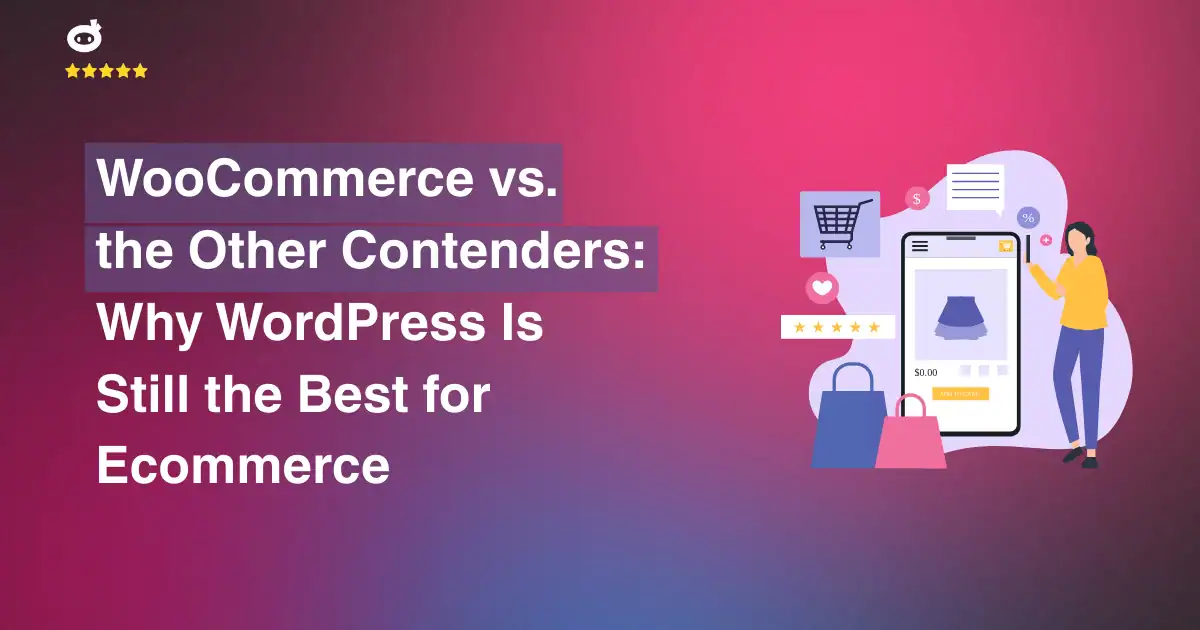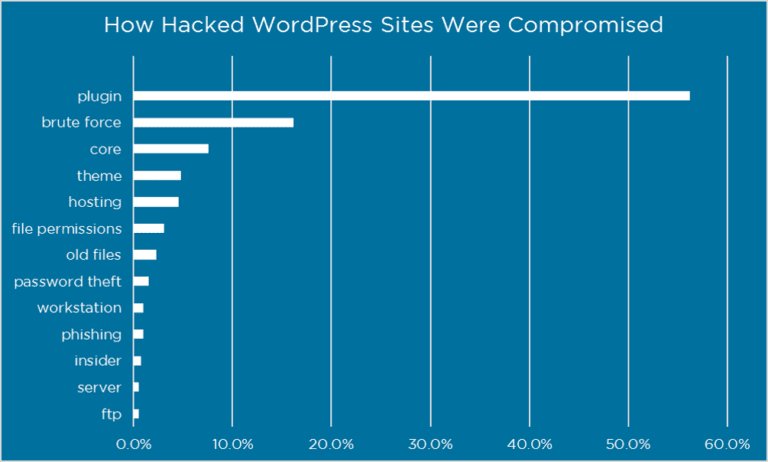The platform you choose for your online store isn’t just about functionality, it’s the backbone of your business. Speed, scalability, customization, and long-term growth all depend on making the right choice. With countless options available, selecting the best e-commerce platform can mean the difference between thriving sales or frustrating limitations.
For millions of businesses, WooCommerce stands out as the top choice, offering unmatched flexibility, cost savings, and seamless integration with WordPress. Unlike closed platforms that lock you into strict designs and expensive monthly fees, WooCommerce provides full control, endless customization, and a pay-as-you-grow model. Businesses of all sizes, from startups to large enterprises, benefit from its scalability and SEO-friendly foundation, making it easier to attract organic traffic and rank higher in search results.
But how does it compare to Shopify, Magento, Wix, and BigCommerce? This article takes a closer look at why WooCommerce continues to lead the e-commerce industry, helping businesses scale, customize, and dominate the digital marketplace. Whether you’re launching a new store or expanding an established brand, WooCommerce provides the control, flexibility, and growth potential you need to succeed.
Contents
- 1 Understanding WooCommerce and Its Market Position
- 2 Key Features and Benefits of WooCommerce
- 3 Comparing WooCommerce with Other Leading E-commerce Platforms
- 4 WooCommerce and SEO: Why It’s the Best Choice
- 5 WooCommerce’s Unmatched Marketing Power and Seamless Scalability
- 6 Community Support and Ecosystem
- 7 Potential Considerations and Challenges
- 8 Conclusion
Understanding WooCommerce and Its Market Position
What is WooCommerce?
WooCommerce is an open-source e-commerce plugin designed specifically for WordPress, launched in 2011 by WooThemes and later acquired by Automattic in 2015. It has since evolved into the most widely used e-commerce solution globally.
Key Features That Make WooCommerce Stand Out:
- Seamless WordPress Integration – WooCommerce transforms any WordPress website into a fully functional online store.
- High Customizability – With over 1,000 extensions and themes, businesses can tailor their store’s design and functionality.
- Scalability – Whether you run a small online boutique or a large enterprise, WooCommerce scales with your business.
- Ownership & Control – Unlike Shopify or Wix, WooCommerce gives you full control over your data, hosting, and customization.
- Supports Multiple Business Models – From physical and digital products to subscription-based services, memberships, and bookings, WooCommerce accommodates various business types.
With its developer-friendly architecture, WooCommerce allows store owners to modify code, integrate third-party tools, and optimize performance, making it the preferred choice for those seeking flexibility and control.
WooCommerce dominates the e-commerce industry with an impressive market share:
- 39% market share among all e-commerce platforms globally.
- Powers over 6.6 million live websites, including both small businesses and large enterprises.
- As of recent statistics, over 28% of the top 1 million e-commerce sites run on WooCommerce.
- Offers a massive ecosystem with over 1,000 plugins for added functionality, covering everything from SEO and analytics to inventory management and multi-channel selling.
With its ever-growing community, regular updates, and limitless scalability, WooCommerce remains a frontrunner in the e-commerce space, outperforming many proprietary solutions.
Key Features and Benefits of WooCommerce
1. Seamless Integration with WordPress
WooCommerce integrates flawlessly with WordPress, utilizing its powerful content management system to provide an all-in-one solution for e-commerce businesses.
- Unified Content & Commerce:
- Manage blogs, product listings, and marketing within a single dashboard.
- Seamlessly switch between content and sales, improving engagement and conversions.
- User-Friendly Dashboard:
- Simplifies store management, reducing the learning curve for beginners.
- Easily handle orders, inventory, and customer interactions from one interface.
- SEO & Marketing Advantages:
- Customizable meta descriptions, permalinks, and rich snippets for better rankings.
- Leverage WordPress’s built-in SEO tools for organic traffic growth.
- Scalability:
- Supports businesses of all sizes, from startups to enterprises.
- Efficiently manages an expanding product catalog and increasing web traffic.
2. Customization & Flexibility
WooCommerce offers a highly customizable platform, allowing businesses to tailor their online stores according to their brand and functional needs.
- Themes & Plugins:
- Thousands of free and premium themes for a professional storefront.
- Plugins for extending functionality, from advanced filters to loyalty programs.
- Custom Store Design:
- Modify layouts, colors, and typography with drag-and-drop builders.
- Utilize page builders like Elementor and Gutenberg for seamless customization.
- Developer-Friendly:
- The open-source nature allows for extensive code modifications.
- Custom integrations with third-party services and software.
- Product Personalization:
- Offer variations in size, color, and customization for personalized shopping.
- Implement dynamic pricing and product bundles for better sales opportunities.
3. Cost-Effectiveness
WooCommerce is one of the most budget-friendly e-commerce solutions, making it a preferred choice for businesses of all sizes.
- Free Core Plugin:
- No mandatory subscription fees, unlike Shopify or BigCommerce.
- Allows businesses to launch an online store with minimal investment.
- No Transaction Fees:
- Keep full control of revenue without platform-imposed charges.
- Choose payment gateways that best-fit business needs.
- Affordable Customization:
- Many free and low-cost premium plugins provide added functionalities.
- Scale features as needed without incurring unnecessary costs.
- Choice of Hosting:
- Businesses can select hosting providers based on budget and performance.
- Flexible hosting ensures better control over speed and security.
4. Scalability
WooCommerce is designed to support businesses at every stage of growth, from startups to enterprises handling massive inventories and traffic.
- Handles Large Inventories & Traffic:
- Supports thousands of products with optimized hosting.
- Ensures smooth performance with caching and content delivery networks (CDNs).
- Flexible Hosting Options:
- Choose shared, VPS, or dedicated hosting based on business growth.
- Upgrade hosting solutions as store traffic increases.
- Multilingual & Multi-Currency Support:
- Expand globally with translation plugins and multi-currency options.
- Automate tax and shipping calculations for different regions.
- Advanced Security Measures:
- Works with SSL certificates and secure payment gateways.
- Integrates with third-party security plugins for enhanced data protection.
- Automation & AI Integration:
- Use AI-driven chatbots for customer support.
- Automate marketing, order management, and customer retention strategies.
Comparing WooCommerce with Other Leading E-commerce Platforms
→ WooCommerce vs. Shopify
When choosing an e-commerce platform, the battle between WooCommerce and Shopify is one of control versus convenience. While both are powerful, they cater to different business needs.
Ease of Use
- Shopify offers an intuitive, user-friendly interface with a straightforward setup. Even beginners can launch a store in minutes.
- WooCommerce, being a WordPress plugin, requires a learning curve. However, it provides greater control over site functionality, making it ideal for businesses that want customization over convenience.
Customization & Flexibility
- Shopify has a limited number of themes and apps, restricting deep customization.
- WooCommerce, being open-source, offers limitless design modifications, plugin integrations, and code-level tweaks.
Transaction Fees & Pricing
- Shopify has fixed monthly pricing but also charges transaction fees unless Shopify Payments is used.
- WooCommerce is free, with costs dependent on hosting, themes, and plugins—allowing businesses to scale affordably.
SEO & Blogging
- WooCommerce, powered by WordPress, excels in SEO with robust plugins like Yoast.
- Shopify has basic blogging features but lacks the advanced SEO flexibility of WordPress.
For businesses prioritizing flexibility, scalability, and SEO dominance, WooCommerce remains the superior choice.
→ WooCommerce vs Magento
When selecting an e-commerce platform, businesses must weigh factors like scalability, ease of use, and costs. Both WooCommerce and Magento are powerful, but they serve different audiences.
Target Audience
- Magento is built for large enterprises with high traffic and complex requirements. It’s ideal for companies needing advanced scalability and customization.
- WooCommerce is suitable for businesses of all sizes, from startups to established brands. Its seamless WordPress integration makes it a top choice for content-driven e-commerce stores.
Development Complexity
- WooCommerce is beginner-friendly, requiring minimal technical expertise. Users can install it quickly and manage their store with ease.
- Magento has a steep learning curve and demands strong coding skills, making it better suited for businesses with in-house developers.
Hosting & Maintenance
- Magento requires high-performance hosting and dedicated server resources. Maintenance is often costly.
- WooCommerce runs on shared hosting, reducing expenses, and is easier to maintain.
Customization & Development
- Magento allows deep customization but requires professional developers.
- WooCommerce offers thousands of plugins, making customization more accessible and cost-effective.
For most businesses, WooCommerce is the superior choice due to its flexibility, ease of use, and affordability.
→ WooCommerce vs BigCommerce: A Detailed Comparison
When it comes to choosing an e-commerce platform, WooCommerce and BigCommerce are two strong contenders. While BigCommerce offers an all-in-one solution, WooCommerce—powered by WordPress—remains a preferred choice due to its flexibility and cost-effectiveness.
Ease of Use
- BigCommerce: Comes with built-in features, making it easier for beginners but offering limited control over customization.
- WooCommerce: Requires some setup but provides unmatched customization, enabling businesses to tailor every aspect of their store.
Costs & Fees
- BigCommerce: Monthly subscription plans can become costly as business scales.
- WooCommerce: No fixed monthly fees—users have control over hosting, themes, and plugins, making it more budget-friendly.
SEO & Marketing
- WooCommerce: Superior SEO capabilities with WordPress, allowing better content marketing and ranking.
- BigCommerce: Has built-in SEO tools but lacks the extensive options provided by WordPress plugins.
For businesses seeking flexibility, cost control, and SEO advantages, WooCommerce remains the undisputed winner over BigCommerce.
→ WooCommerce vs Wix
When it comes to e-commerce, WooCommerce and Wix serve different purposes. While Wix is ideal for beginners looking for a simple, all-in-one solution, WooCommerce, a WordPress plugin, offers unparalleled flexibility and scalability for serious online businesses.
Why Choose Wix?
- Ease of Use: Drag-and-drop functionality makes it user-friendly for beginners.
- All-in-One Solution: Hosting, security, and website building are integrated.
- Great for Small Stores: Best suited for businesses with limited product lines.
Why WooCommerce Stands Out?
- Customization & Control: With thousands of themes and plugins, WooCommerce allows deep customization.
- SEO & Performance: WordPress gives better control over SEO, loading speed, and user experience.
- Scalability: Handles large product catalogs, multiple payment gateways, and advanced marketing tools.
- Ownership & Flexibility: Unlike Wix, which has closed hosting, WooCommerce gives you full control over your site.
If you seek long-term growth, WooCommerce is the superior choice, offering limitless potential for expansion.
→ WooCommerce vs. Squarespace
When comparing WooCommerce and Squarespace, the primary distinction lies in flexibility versus ease of use. Squarespace is a sleek, all-in-one platform that shines in design, but WooCommerce, being an open-source WordPress plugin, delivers unmatched e-commerce capabilities.
Key Differences:
- Customization & Scalability:
- WooCommerce offers complete control over design, features, and functionality. With thousands of themes and plugins, businesses can create tailored shopping experiences.
- Squarespace, though visually appealing, has limited customization. You’re restricted to built-in templates and tools.
- Payment Gateways & Transaction Fees:
- WooCommerce supports hundreds of payment gateways like Stripe, PayPal, and local banks.
- Squarespace supports fewer payment options, often imposing additional transaction fees.
- Ownership & Cost:
- WooCommerce allows full website ownership, while Squarespace operates on a subscription model.
While Squarespace is ideal for beginners, WooCommerce is the superior choice for businesses seeking flexibility, control, and growth.
WooCommerce and SEO: Why It’s the Best Choice
For e-commerce businesses, SEO is the key to visibility, traffic, and conversions. WooCommerce, built on WordPress, offers unmatched flexibility, advanced optimization tools, and a powerful content marketing edge over competitors like Shopify.
Here’s why WooCommerce stands out in SEO.
1. SEO Features in WooCommerce
WooCommerce provides granular SEO control, primarily through plugins like Yoast SEO and Rank Math, which offer:
- Customizable metadata – Modify title tags, meta descriptions, and URLs for every product and page.
- Rich snippets & schema markup – Display ratings, pricing, and stock availability in search results.
- Breadcrumb navigation – Improve user experience and search engine crawlability.
- Canonical URLs – Prevent duplicate content and maintain SEO integrity.
- XML sitemaps & robots.txt – Guide search engines to index the right content.
Unlike Shopify, which enforces a rigid URL structure (/collections/, /products/), WooCommerce allows fully customizable, SEO-friendly URLs that improve keyword relevance and search rankings.
2. Content Marketing & Blogging
SEO thrives on quality content, and WooCommerce, being WordPress-based, is far superior in content marketing.
- Integrated blogging – Easily create and optimize blog posts to attract organic traffic.
- Custom landing pages – Improve conversions with SEO-focused, keyword-rich pages.
- Internal linking – Strengthen site structure and improve indexing by connecting blogs and product pages.
- Multimedia optimization – Use images, videos, and interactive elements effectively for engagement.
Shopify’s blogging features are basic, making it harder to execute a content-driven SEO strategy. WooCommerce enables businesses to leverage content marketing for better organic reach.
3. Mobile Optimization & Performance
With Google’s mobile-first indexing, a responsive and fast website is essential. WooCommerce ensures:
- Mobile-responsive themes – Optimized for seamless browsing across all devices.
- Speed enhancements – Image compression, lazy loading, and caching improve load times.
- AMP (Accelerated Mobile Pages) support – Boosts page speed on mobile, enhancing search rankings.
While Shopify themes are mobile-friendly, they offer limited optimization options. WooCommerce allows for deeper performance enhancements, ensuring better Core Web Vitals scores, a critical SEO ranking factor.
WooCommerce’s Unmatched Marketing Power and Seamless Scalability
WooCommerce dominates the e-commerce space, offering businesses unparalleled flexibility, powerful marketing tools, and effortless scalability. As a WordPress-powered platform, it provides complete control over branding, customer engagement, and growth potential—making it a top choice for businesses of all sizes.
Superior Marketing Capabilities
WooCommerce provides a comprehensive set of tools designed to drive traffic, increase conversions, and build customer loyalty.
SEO and Content Marketing
- Built on WordPress, WooCommerce excels in search engine optimization (SEO), ensuring better rankings on Google.
- Seamless integration with Yoast SEO and Rank Math helps optimize product pages, blogs, and meta descriptions.
- The blogging capabilities of WordPress provide an edge in content marketing, attracting organic traffic.
Email and Social Media Marketing
- Integrates with Mailchimp, Klaviyo, and HubSpot, allowing automated email sequences, personalized campaigns, and cart recovery emails.
- Supports direct selling via Facebook, Instagram, and Google Shopping, ensuring broader customer reach.
- Allows affiliate marketing programs through specialized plugins to drive sales without paid ads.
Promotions and Conversion Boosters
- Easy-to-implement discounts, coupons, and flash sales drive urgency and increase conversions.
- Upselling and cross-selling features recommend products based on customer behavior.
- AI-driven personalization tools provide targeted recommendations to boost revenue.
Effortless Scalability: Growing Without Limits
WooCommerce grows with your business, whether you’re a startup or an enterprise.
Hosting and Performance Optimization
- Unlike Shopify, WooCommerce allows businesses to choose their hosting provider, ensuring cost efficiency and custom scalability.
- Supports CDN integration, caching, and optimized databases to handle high traffic smoothly.
Limitless Customization
- Offers over 50,000 plugins to expand functionality, whether adding memberships, subscriptions, or multi-vendor marketplaces.
- Custom themes and page builders (like Elementor and Divi) provide complete design freedom.
Advanced Inventory and Payment Flexibility
- Supports unlimited products, SKUs, and bulk inventory management, making it ideal for businesses with large product catalogs.
- Accepts multiple payment gateways, including Stripe, PayPal, and regional options, ensuring global transaction ease.
International Expansion Made Easy
- Built-in multi-currency and multilingual support help businesses reach customers worldwide without hassle.
- Integrates with shipping carriers like FedEx, UPS, and DHL, offering automated shipping rate calculations.
Community Support and Ecosystem
When it comes to e-commerce, having a strong support system and a vast ecosystem of tools can make or break an online store’s success. WooCommerce, being a WordPress-powered platform, thrives in this aspect, outshining many other contenders.
1. Extensive Community and Developer Support
WooCommerce thrives on a vast and engaged community, ensuring continuous improvements, security, and innovation. Its open-source nature attracts millions of developers and contributors, making it a reliable and ever-evolving platform.
- Continuous Improvements – Regular updates and security patches keep WooCommerce optimized, driven by Automattic and independent developers worldwide.
- Diverse Support Channels – Users can access official documentation, community forums, and social media groups for troubleshooting and expert discussions.
- Expert Guidance – A global network of WooCommerce specialists and agencies provides professional support for store setup, customization, and optimization.
- Tutorials & Knowledge Base – Extensive learning resources, including blogs, video tutorials, and online courses, help users at all skill levels.
This vast support network makes WooCommerce more beginner-friendly while still offering robust solutions for advanced users.
2. Ecosystem of Extensions and Plugins
Another defining strength of WooCommerce is its unparalleled flexibility through its vast ecosystem of plugins and extensions.
- Over 1,500 WooCommerce Themes: A wide variety of free and premium themes cater to different industries, ensuring a seamless and professional storefront.
- Extensive Plugin Library: WooCommerce offers thousands of plugins that extend functionality, including:
- Subscriptions & Memberships: Offer recurring billing and exclusive content to loyal customers.
- Bookings & Appointments: Ideal for service-based businesses, allowing customers to schedule sessions effortlessly.
- Advanced SEO & Marketing: Enhance visibility with plugins like Rank Math and Yoast SEO, or run effective promotions using discount and affiliate marketing plugins.
- Payment & Shipping Integrations: Supports multiple payment gateways, automated tax calculations, and seamless logistics integrations.
With a thriving marketplace and a continuous influx of innovative solutions, WooCommerce remains the most adaptable and scalable e-commerce platform, solidifying WordPress as the best choice for online businesses.
Potential Considerations and Challenges
-
Technical Requirements
WooCommerce is a self-hosted platform, meaning users must manage their website’s hosting, setup, and maintenance. Unlike Shopify or Wix, which handle technical aspects, WooCommerce requires hands-on involvement for optimal performance.
- Hosting & Setup – Users need to buy a domain, choose a hosting provider, and install WordPress before setting up WooCommerce. While some hosting providers offer one-click installation, proper configuration still requires basic technical skills.
- Security & Maintenance – Regular updates for WordPress, themes, and plugins are required to maintain security and performance.
- Customization & Development – WooCommerce allows unlimited customization, but advanced customizations may require coding skills like PHP, HTML, or CSS for modifications.
Despite these technical responsibilities, WooCommerce offers unmatched control, full ownership, and the flexibility to build and scale a store without third-party restrictions.
-
Learning Curve
WooCommerce has a steeper learning curve than hosted e-commerce platforms, but the effort leads to greater flexibility and control. While it requires more setup and maintenance, it offers unmatched customization and long-term scalability.
- More Control, More Responsibility – Shopify and Wix offer plug-and-play simplicity but limit customization options. WooCommerce requires learning WordPress, but it provides full control over store design, features, and functionality.
- Plugin & Extension Management – WooCommerce has a vast selection of extensions for payments, SEO, and security. While beginners may find this overwhelming, choosing the right plugins enhances store performance and efficiency.
- Time Investment – Shopify and Wix have guided interfaces that are easier to use for beginners. However, once mastered, WooCommerce becomes a more powerful and adaptable solution for growing businesses.
Although WooCommerce requires more effort, it rewards users with complete ownership, scalability, and the flexibility to build a truly unique online store.
Case Study: How WooCommerce Helped All Blacks Official Store Scale Their E-commerce Operations
The Challenge
The All Blacks Official Store, the e-commerce platform for New Zealand’s national rugby team, needed a scalable and flexible solution to handle its global fan base and high-traffic surges during major sporting events. Initially, their store was hosted on Shopify, but they faced several limitations:
- High Transaction Fees: Shopify’s percentage-based commission on sales was cutting into profits.
- Customization Restrictions: The team needed a highly personalized storefront, which Shopify’s rigid structure couldn’t support.
- Performance Issues During High Traffic Events: Product launches and match days led to site slowdowns and checkout failures.
The WooCommerce Solution
After migrating to WooCommerce, the All Blacks store leveraged its open-source flexibility and vast plugin ecosystem to resolve these issues:
✅ Custom Checkout Enhancements:
- Integrated WooCommerce Checkout Field Editor to streamline international shipping fields.
- Implemented one-page checkout for faster conversions.
✅ Optimized Performance for High Traffic:
- Used LiteSpeed Cache and WP Rocket to reduce page load times by 30%.
- Implemented cloud-based autoscaling to handle traffic spikes.
✅ Improved Monetization with Subscriptions & Personalized Offers:
- Leveraged WooCommerce Subscriptions to create an exclusive “All Blacks Fan Club” with recurring merchandise drops.
- Integrated AI-driven product recommendations based on user purchase behavior.
✅ Lower Operational Costs & Better Profit Margins:
- Eliminated Shopify’s high transaction fees by using WooCommerce’s direct payment integrations.
- Saved thousands of dollars annually on app subscriptions since WooCommerce provided built-in functionality.
Results & Impact
- 40% increase in international sales due to better checkout experience.
- Significant reduction in operational costs, boosting profit margins.
- Seamless handling of peak traffic during Rugby World Cup, ensuring zero downtime.
By switching to WooCommerce, the All Blacks Official Store not only enhanced its customer experience but also gained full control over its e-commerce operations, proving why WordPress remains the best choice for growing online businesses.
Conclusion
Most e-commerce platforms have hidden limitations, restrictive customization, mandatory fees, or lack of control over your store. WooCommerce breaks those barriers, offering complete flexibility, cost-efficiency, and unlimited scalability. It’s the ultimate choice for businesses that want freedom to grow on their terms.
Unlike Shopify or Wix, WooCommerce runs on WordPress, providing full customization with themes, plugins, and advanced development options. Businesses can shape their store exactly as they envision, without platform restrictions. Plus, WooCommerce’s built-in SEO capabilities give stores a natural advantage in driving organic traffic and boosting visibility.
Affordability is another major advantage. There are no forced subscription fees, you only pay for the features you need. Whether you’re a small business or a fast-scaling enterprise, WooCommerce adapts effortlessly to your growth without performance limitations.
Beyond its flexibility, WooCommerce thrives on constant innovation. A vast developer community ensures continuous improvements, powerful integrations, and expert support. Most importantly, you own your store, no external platform dictates how you run your business.
For brands that demand total control, long-term scalability, and true independence, WooCommerce remains the most powerful and future-ready e-commerce solution available.
Written by Lars Koudal








